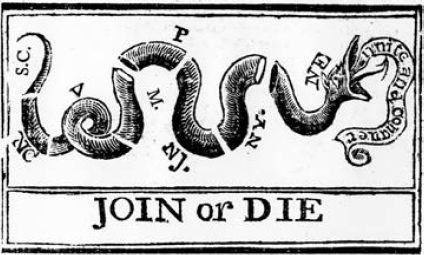It’s been one year since a middle school student made national headlines for refusing to remove a Gadsden Flag emblem from his backpack. In light of this anniversary, we thought we’d take a moment to reflect on the history and impact of this iconic rattlesnake.
Join or Die
The first appearance of the rattlesnake came about in a 1754 edition of the Pennsylvania Gazette. Benjamin Franklin published the famous “Join or Die” cartoon that featured a severed rattlesnake.

This wasn’t just a clever image; it was a call for the 13 Colonies to unite against a common enemy: the British. (Fun fact: rattlesnakes are only found in the Americas, meaning they were a foreign creature to the British.)
A Libertarian Mascot?
Check out the description of the rattlesnake entry in a publication by the US Department of Agriculture:
Generally not aggressive, rattlesnakes strike when threatened or deliberately provoked, but given room, they will retreat.
So long as you leave it alone, the rattlesnake is glad to let you continue your hike unharmed. But if provoked, the rattlesnake turns out to be a formidable foe. This way of operating aligns with the principle of non-agression.
The rattlesnake’s image was eventually placed over a yellow background, becoming the image we so readily recognize today:
As it turns out, this yellow background is also the reason the Libertarian party in the U.S. today uses yellow and gold as its primary colors.
The Murkiness of Meaning
The question raised when Jaiden Rodgriguez strode into his school with the flag displayed on his backpack is less one of history, and more one of meaning.
See Jaiden’s appearance at LIbertyCon:
For example, for people with a left-leaning view of the political landscape, the Gadsden Flag tends to be viewed as an offensive, even dangerous symbol. Progressive-leaning folks also tend to associate the flag with hardcore MAGA sentiments and, perhaps most saliently, with the violent protests that broke out at the Capitol on January 6th, 2021.
But as Supreme Court Justice Oliver Wendell Holmes once said, “We live by symbols. And what shall be symbolized by any image of the sight depends upon the mind of him who sees it.”
By way of contrast, classical liberal embracers of the Gadsden Flag hold to an interpretation of self-determination in the face of unjust authority.
What is the nature of that unjust authority? For pro-liberty folks, at least, force is force, and unwanted authority is unwanted authority — whether it’s foreign invaders and tax collectors, or a domestic political class that seeks to control everyday citizens.
Losing to an Eagle
Despite its head start, the rattlesnake did not win out as the official animal of the United States. Instead, as you probably know, it was the bald eagle. Benjamin Franklin was not pleased with this outcome. He had some strong words to say, in fact, about the not-so-courageous eagle:
“I wish the bald eagle had not been chosen as the representative of our country,” he wrote. The eagle is “a bird of bad moral character” that “does not get his living honestly” and is “too lazy to fish for himself.”
In the end, we know that a symbol doesn’t have just one meaning. Its meaning is contextual, both for an individual and for a group.
Here’s what the rattlesnake means to many pro-liberty folks, though: As Benjamin Franklin wrote. “An emblem of vigilance,” and a vision for America as a land of peaceful, non-aggressive strength. Far from a symbol of hatred, the rattlesnake has long meant to the liberty-minded a healthy skepticism of authority and a resistance to its demands.
KEEP THE LEARNING GOING! See the video this post draws on:
Are you a student interested in getting involved in pro-liberty activism? By applying to join Students For Liberty’s Local Coordinator Program, you can be supported in promoting the ideas of liberty while also developing your skills and meeting many like-minded students from across the world. Click on the button below to find out more and get involved!
This piece solely expresses the opinion of the author and not necessarily the organization as a whole. Students For Liberty is committed to facilitating a broad dialogue for liberty, representing a variety of opinions.


